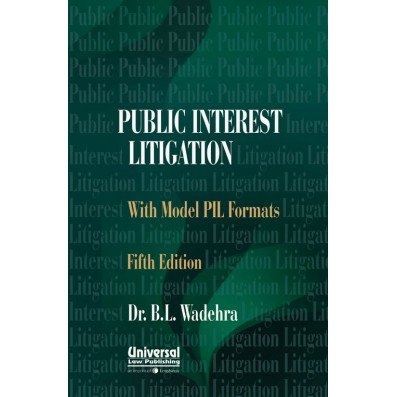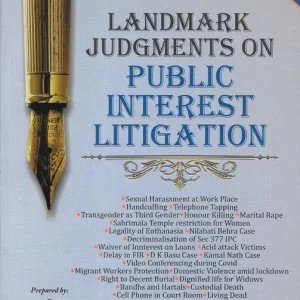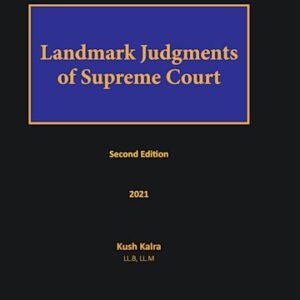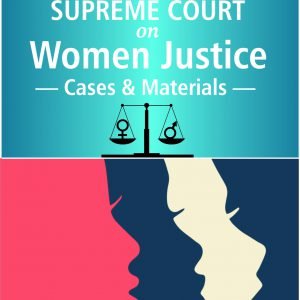Sale!
SUPREME COURT SELECTED LEADING CASES BY K GURURAJA CHARI
Original price was: ₹2,495.00.₹1,870.00Current price is: ₹1,870.00.
What are Leading Cases? Why are they regarded as Leading Cases?
Among the various cases that are argued and determined in the Courts, some, form their important character have demanded more than usual attention from the Judges, and from this circumstance are frequently looked upon as having settled or determined the law upon all points involved in such cases, and as guides for subsequent decisions, and from the importance they thus acquire arc familiarly termed “leading cases.:
-Black’s Dictionary of Law 5th Edition – Page 800.
(1) Most strictly, a judicial precedent that first definitely settled an important rule of principle of law and that has since been often and consistently followed;
(2) Less strictly, an important, often the most important, judicial precedent on a particular legal issue.
-BRYAN. A. GARNER A dictionary of Modern Legal Usage 2nd Edition -Page 513.
On the 15th August, 1947 India became a free country. The constituent Assembly in the Dominion of India, after deliberations extending over a period of more than two years, resolved to constitute India into a ‘Sovereign Democratic Republic and framed a new Constitution for the country on the 26th of November, 1949. Most of the provisions of the Constitution. however, came into force on the 26th January. 1950, the official date of its commencement.
One feature of far-reaching consequence of the new Constitution was declaration in part III of certain Fundamental Rights the magna carta of our rights securing for us Justice, social, economic and political. Liberty of thought, expression, belief faith and worship and Equality of status, and the principle of judicial review of legislative and executive acts and of declaring constitutional remedy for enforcement of these fundamental rights. Article 32 of the Constitution gave power to the Supreme Court to issue directions, orders or writs, including writs in the nature of habeas corpus, mandamus, prohibition, quo warranto and certiorari for enforcement of these rights.
The Constitution declares all “laws” in force in the territory of India immediately before its commencement in so far as they are inconsistent With Part III of the Constitution to be void to the extent of such inconsistency. Similarly, under the Constitution the State cannot make any law which takes away or abridges the right conferred by Part III and any law made in contravention of this provision is void to the extend of the contravention. After the commencement of the constitution therefore, a number of laws in force in the country have come up for judicial review before the Supreme Court both on the original side as well as on the appellate side during the last several years and quite a large number of important judicial pronouncements have been made by this Court, and principles of law explaining these and other provisions of the Constitution laid down. The Supreme Court being the court of highest adjudication relating to all judicial matters within its jurisdiction, the Constitution has rightly provided in Article 141 that “the law declared by the Supreme Court shall be binding on all Courts within the territory of India.” Knowledge of the law declared by the Supreme Court is therefore absolutely essential not only for the Bench and the Bar but also for those who are to make ‘law’ or have to administer ‘law’ in some form or the other. It is equally essential for all those who are governed by ‘law’ to know about it. This is. however, by no means easy. The officially reported decisions of the Supreme Court for the back years run into thousands of pages, and these are not arranged subject-wise or in any other order so as to admit of easy reference. A suitable important decisions highlighting several decisions of Supreme Court is thus a bare necessity.
The present work deals with selected leading cases relating to the Constitution of India. As there is a frequent occasion to refer to decisions of the Supreme Court on the Constitution of India both by the Bench and the Bar and others who have to deal with this subject, a necessity for publishing this important selected cases digest (handy volume) separately has been keenly felt at the suggestion of some friends in the profession to whom I am indebted for it.
The need for this type of book has been long felt particularly by young lawyers who are desirous of appearing for Advocates-on-Record Examination held by the Supreme Court of India. The beginners in the profession would find it difficult to refer to the voluminous judgments and taking out their time in addition to their difficulties experienced by young lawyers. List of selected Leading Cases provided in this book would be of some help to my colleagues. At the same time, I have taken much care and caution to incorporate most of the material given in the detailed Supreme Court judgments, so that, they get every thing under one roof which was not at all available to prepare for the Examination.
This book is not meant to be a treaties or an encyclopedia. It is just reference handy book, and if the reader finds at places a cursory treatment he author may well be excused.
The contents of this book are fair excerpts from the text of judgments of the Supreme Court which in the authors sincere perception represent L true summary thereof for the purpose of the present book. However. I would appeal to my readers to kindly refer to the full text for detailed judgment and citation. I acknowledge my indebtedness to all the past authors – Indian and fore whose books I have made reference in writing and compiling this selected leading cases book.
Additional information
| BINDING | Hardcover |
|---|---|
| AUTHOR | K GURURAJA CHARI |
| ISBN | 9789380751009 |
| PUBLICATION | WADHWA & COMPANY |
| YEAR OF PUBLICATION | 2019 |








Reviews
There are no reviews yet.